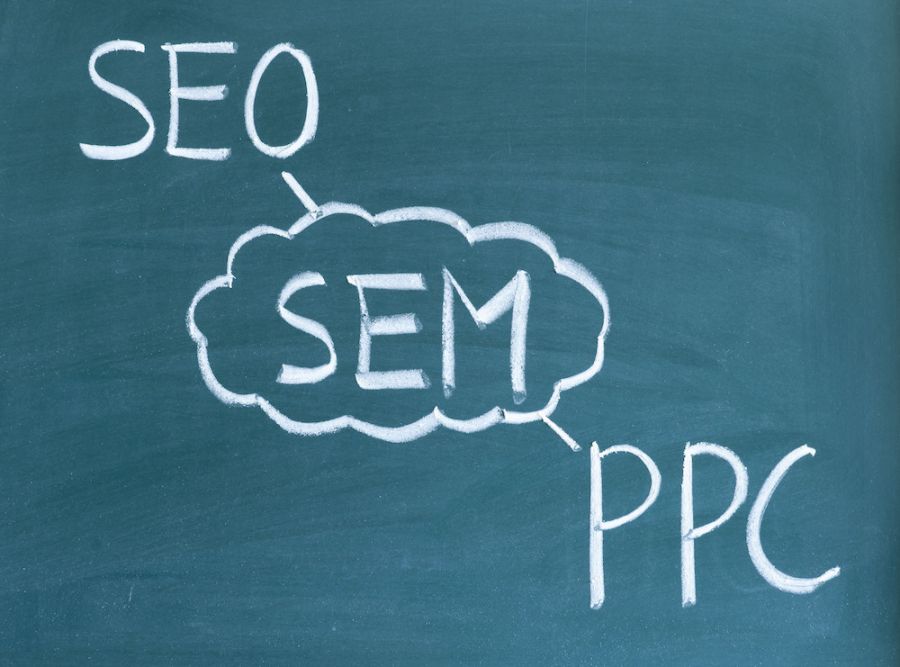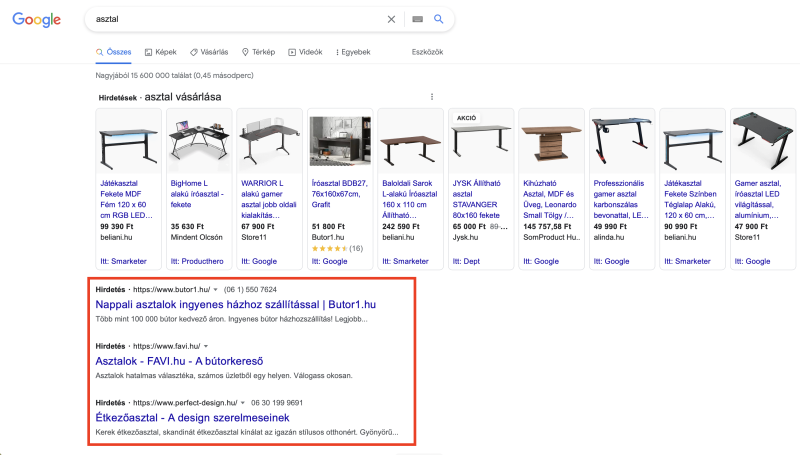Google Ads: stand out of the crowd!
The power of Google
Google is the world's leading search engine, where users navigate using a variety of keywords. Companies aim to get their websites as high as possible in the keyword search rankings, simply because internet users don't scroll past the first page of the results list. So, if you want your message to get through, you need to get ahead. This can be achieved in two ways: through advertising and through search engine optimisation.
Search engine optimisation is a systematic process of adding text to a website that is useful to the user because it is informative, useful to the company because it demonstrates your own expertise and, most importantly, that search engines like because it meets their ranking criteria. The SEO of a site depends on a number of factors, but the production of SEO-optimised texts plays an important role in the process.
SEO is necessary and very useful, and will definitely pay off in the long run, but there is another way to drive traffic to the site, and that is through advertising.
What is Google Ads and what are the benefits?
The benefits of Google Ads
EFFECTIVE
Google advertising can be very effective. Imagine if someone is searching in Google for children's hairdressing in Budapest and your ad appears first as a children's hairdressing salon in Budapest. It couldn't be better!
You search and you get an exact match. This requires, among other things, that the advertisement is well-worded and that the right keywords are used. And yes, there will certainly be a lot of good hairdressers' websites in Budapest behind you in the results list, but the important thing is that your website will be the first to be clicked on.
GENERATES CONVERSIONS
YIELDS QUICKLY VISIBLE RESULTS
COST-EFFECTIVE
But only if thorough research precedes the campaign setup. The advantage of Google advertising is that you only pay for real results or actual clicks.
However, if the ad is not relevant, interesting or reaches the wrong audience, you may get the clicks, but not the purchase/booking/request.
The result is similar if the landing page, i.e. where the ad points to, is deficient. So it's certainly cheaper than a billboard campaign or a TV spot, but it's a good idea to be careful and to prepare and plan your ads, campaigns and landing pages carefully.
MEASURABLE
What types of Google Ads campaigns are there?
SEARCH ADVERTISING
DISPLAY AD
Display advertising is most commonly found on websites and in applications in the form of banners, sometimes also in the form of text ads. This type of ad is a powerful branding tool: for example, if you place a banner on a popular news site, it will reach a lot of people. It's another question of how many people will click.
The number of online ads and advertisements has increased dramatically, and the result is that anywhere you click, anywhere you look, ads are looking back at you. At the same time, advertising avoidance has reached unprecedented levels, and the banner is a clearly identifiable advertising content. But if you place a creative, imaginative, eye-catching banner on a busy and relevant website, you can expect an increase in brand awareness and even website traffic.
The display advertising camp is also strengthened by Gmail ads, where the ad appears in the mailbox under the Promotions category. A surprisingly high click-through rate is achieved here, but it is generally cheaper than search ads. It is not worth running this kind of ad at the start of a promotion or campaign, but rather when, for example, the Google search ad is already running and performing well, but you want to add a little extra, or if you are using it for remarketing.
VIDEO ADVERTISEMENT
SHOPPING AD
REMARKETING AD
Structure of Google Ads
Ads can fall into three categories: the ad, the ad group and the campaign.
- The campaign category is the broadest level, where you can set the budget, the geographic targeting, the language and how the bidding is done, among other things.
- The next category is the ad group, where you can specify the keywords that will apply to all the ads you create within the group.
- The narrowest level is therefore the ad itself, which will run according to the terms you have previously specified.
How much does Google Ads cost?
The price of Google Ads advertisements is influenced by a number of factors, including the number of clicks or conversions. There is the option to set the maximum amount you pay per click or conversion yourself, and also the option for Google to calculate the optimum limit.
You may get feedback during the setup process that the amount you have offered is not enough for the first page. In this case, if we stick to this keyword and parameters, we will have to increase the budget, thus outbidding other bids.
How much a click ultimately costs, depends on the competition. There may be popular terms where it can be close to a thousand forints a click, but there may also be some where it is under 50 forints.
Google Ads steps
REGISTRATION
BACKGROUND RESEARCH
KEYWORD RESEARCH
- General match: also shown for Google Ads misspellings, synonyms and related searches.
- Exclusion: it is possible to exclude certain words from the search, words that could mislead the search.
- Expression matching: Google Ads ads will appear if the keyword you specify is included in the search expression, but other words may be included before or after it.
- Exact match: ads are only shown if the keyword is an exact match or a close variant of the keyword.
AD TEXT
When is it worth to advertise?
The answer is simple: start driving traffic to your website when you're ready. In every sense. If you know the click-through path, if everything on your website works, UX and UI are in order and even the content is in demand, then it's time to open the virtual gates.
However, if not everything is ready, then Google Ads is a waste of money, and worse, the visitor may have had such a bad experience that they will never return to your website.
Digital advertising to boost revenues
This is how we work:
- We will conduct an audit, review your advertising account, identify gaps and map strengths.
- A campaign and media plan will be developed, one that best aligns with the objectives we previously agreed on. We advertise where you need it!
- Ads are created, best rates negotiated and campaigns sharpened. We monitor them constantly and optimise them based on the data we receive.
- We produce detailed reports on the results achieved.
At Meraki we believe and advocate that modern marketing tools can be used not only by the big players, but also by the small ones with a little skill. With our personalised advertising technology, we've managed hundreds of PPC campaigns for SMEs on Google, Facebook, LinkedIn and more.


























